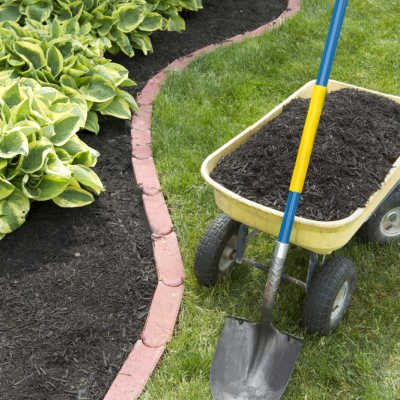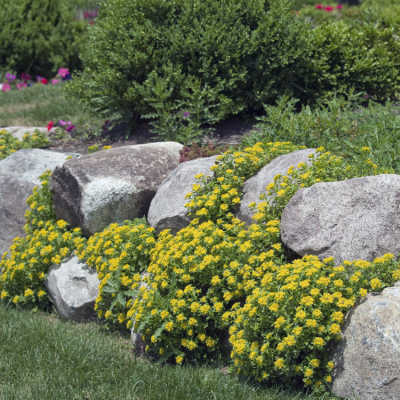
Erica Groneman

There are more ways to deal with pesky weeds than pulling out the conventional herbicide spray. Here are just a few tips to avoid synthetic products and control weeds using organic methods.
Best Practice - Keep the Ground Covered
The best method of preventing weeds from arising in the first place is to keep the ground covered. When soil is exposed to light, weed seeds are able to germinate and take root. However, if the soil is covered, the amount of weed seeds that germinate is dramatically decreased. You may still have some weeds peek through every once in a while, but they are usually weaker and easier to stay on top of.
How exactly should you cover the ground? By growing plants and covering any other exposed soil with mulch. Many people think covering the ground with a layer of weed-guard plastic is the best option. However, this practice often leads to many more problems down the road. As your plants grow, their root systems can become entangled with the plastic. Plus, it can interfere with how water should naturally drain over the soil’s surface. Eventually, weeds are bound to make their way through this plastic sheet anyways. You might as well choose the best and most sustainable option to start with.

Mulch Barrier

Covering any exposed soil with mulch after planting will keep the soil cool and improve water retention throughout the warm months. As the mulch breaks down, it will also build soil with rich organic matter. Every few years, you will likely need to add some additional mulch on top. Keeping up a mulch layer of 3-4 inches is key to successfully preventing weeds. Any weeds that do develop in the mulch layer should have loose and shallow roots that are easy to remove when spotted.
Groundcovers and Cover Crops
If you have a large open space that needs to be covered in order to prevent weeds, consider using a groundcover. Common groundcovers include grass, clover, wildflowers, and many other low-growing plants. Groundcovers are commonly confused with cover crops. Simply put, groundcovers are ornamental plants grown to cover an area over a long period of time while remaining aesthetically pleasing. Cover crops are instead used as a temporary crop to improve soil quality in preparation of the following seasons garden or crops. These plants are grown with the intent to be killed and worked back into the soil. Growing a cover crop can help suppress weeds between growing seasons.
Use Clean Seeds and Plant Starts
Filling in your growing spaces with plants is the best way to beautify the area while also preventing pesky weeds from growing. Follow appropriate spacing recommendations for ornamental plants to keep a healthy space. When it comes to vegetable gardening, you can often plant more densely than initially thought.
Vegetables will have suggested plant spacing requirements that allow for a plant to develop to its full size. However, you can fit more plants by sowing small or quick-to-mature types between the slower and larger vegetables. Because they mature quickly you can start harvesting before fthey become too crowded. This practice is called intercropping. Additionally, utilizing vertical structures can help lift vining plants off the ground for better air circulation and increased growth opportunities.

Pay attention to the source of what you are putting in your garden. Some plant starts from neighbors or a nursery, for example, may have weeds in them. Check before and after you plant to maintain a clean growing area.
Prepare Your Garden With Clean Soil and Amendments
Make sure any soil amendments you add to your garden are weed-free. If the compost hasn’t been aged well (135-160 degrees F), it may still have viable weed seeds in it. If using old potting soil from a previous season, consider cleaning it before use. Clean soil and water are key to growing healthy plants from seed. If you live in a hot and dry climate or are growing in containers, we recommend using Retain water retention crystals to help your plants stay hydrated and happy.
If you are starting a new garden plot, or your area has been taken over with weeds, you may want to utilize cardboard and mulch to get the area ready for growing. To do this, lay out flat sheets of cardboard over the weeds and dampen. You may need to mow or knock them down before starting. Then, cover the cardboard with a thick 4-6 inch layer of mulch (not bark) and allow time for the cardboard to break down.
Organic Herbicide Options
Yes, there are organic herbicides. No, they are not the herbicides most people are familiar with. Just because an herbicide is organic doesn’t mean less is being used compared to synthetically sourced products. Usually, the use of organic herbicides for weed control requires more applications over a longer period of time. They are also usually made with vinegar or borax base and require the same kind of precaution when being applied as you would synthetic herbicides.

Corn Gluten Meal - One of the best and only preemergence organic options for weed control. Multiple applications over several years are recommended for the best results. Apply at a rate of 20 lbs per 1,000 square feet (20 ft X 50 ft). A great advantage to using corn gluten meal over time is the amount of nitrogen it includes. While suppressing weeds, you can also fertilize your soil. A great option, though it is for sure a long-term investment.

Garlic and Clove Oil - Like other organic methods of control, garlic, and clove oils are most effective against weeds that have already emerged. It is even better if these plants are still young. Additional methods will likely be required as this option will not kill the root systems.

Vinegar AKA Acetic Acid - Vinegar is an effective choice to quickly burn down weed tops. However, it doesn’t do a great job of killing the root systems.
Flame The Weeds Gone
While this can be an effective organic method of weed control, it should be handled very carefuly by someone who knows what they are doing. Be extremely cautious of using this method in dry areas. You can expect flaming to kill any weed that has already emerged, but there is no guarantee for weeds that spread via their root systems. Using multiple methods may be required to completely control a weed problem.
Do Not Let Your Weeds Go to Seed
Don’t ever let a weed go to seed if you can help it. If you don’t have time to weed properly, simply topping the weeds before they go to seed will reduce the number of seeds in your soil. You can do this by mowing, weed whacking, or even pulling off the top of the weed. Then come back for the roots later when you have the time.
By using these organic weeding tips together, over time your garden will be weed free and your soil will thank you for using more sustainable practices to maintain a healthy microbiome. Like we have said before, the key to a great garden is maintaining healthy soil.
Resources For More Information About Organic Weed Control
About the Author

Hi, I’m Erica Groneman. I am a mom, volunteer, and a gardener. There’s something satisfying about getting my hands dirty and watching things grow. I believe gardening is universal and crosses all boundaries, bringing us all together. I hope we can share in the joy of growing together. Thanks for stopping by!
Our Recommended Picks
Leave a comment
Your email address will not be published. Required fields are marked *
5 comments
Mariló Puerta
Very interesting information about weed control. I’m new in the gardening world. I will try the vinegar method. Thank you
Christy
I’m a fallen soldier in the battle of weeds. Thank you for the valuable information. Definitely going to try these suggestions!
Callie Harkness
I let the weeds go crazy in my garden this year! I’m fully planning on transforming it to a no till garden this fall/next spring. Lots of cardboard and mulch in my future!
JC Hollingsworth
Tried the cardboard and mulch thing. I was overwhelmed with weeds. It was a disaster. The weeds even covered my cranberry plants. I couldn’t even see my blueberries in the same garden area. My raised gardens didn’t have that much of a problem. Now I just soak everything in that area and pull. It’s easier to pull weeds when they are wet. The roots come out much easier.
SDee
What is the organic root killer that needs multiple applications., I have white top coming from my neighbor’s yard. Thank you
Further Reading

Harvesting the Incredible Health Benefits of Microgreens
Written By Lara Wadsworth Microgreens are young edible seedlings that are harvested when they are just 1-3 inches tall. These quick-growing plants are emerging as an important food source with numerous health benefits. Their nutrient density can be up ...

Ashleigh Smith
2025-09-306 min read0
Fall Bulb Planting Guide: When, What, and How to Plant for Spring Blooms
Written By Lara Wadsworth If you love colorful and vibrant flowers as early as possible in the springtime, planting fall bulbs is your answer. It’s like magic! You bury little brown things in the autumn, and then you basically forget about them. Then, ...

Ashleigh Smith
2025-09-3012 min read0
Coco Coir and Vermiculite - The Leading Microgreen Growing Mediums
Written By Lara Wadsworth Microgreens are gaining popularity among growers and consumers. They are nutrient-dense, easy to produce, and can turn a profit quickly. The rising demand for efficient growing mediums continues to propel researchers to find b...

Ashleigh Smith
2025-09-306 min read0
Fall Gardening: Essential Perennial Care Tips Before Winter
Written By Lara Wadsworth Microgreens are gaining popularity among growers and consumers. They are nutrient-dense, easy to produce, and can turn a profit quickly. The rising demand for efficient growing mediums continues to propel researchers to find b...

Ashleigh Smith
2025-09-3013 min read0







